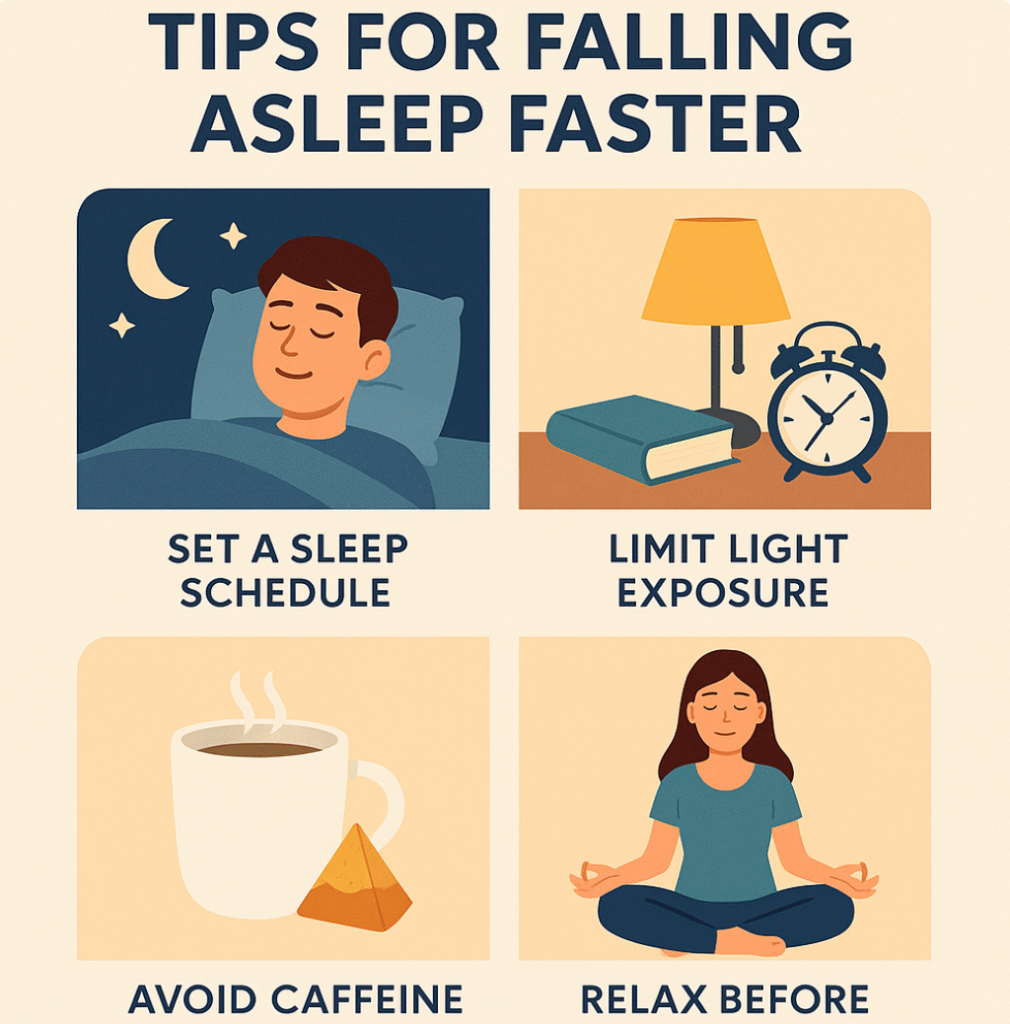Sleep is one of the most vital yet overlooked components of overall health. According to the Centers for Disease Control and Prevention (CDC), one in three adults in the U.S. doesn’t get enough sleep. Chronic sleep deprivation is linked to weakened immunity, impaired focus, mood disorders, obesity, and cardiovascular disease.
This article, written in accordance with Google’s E-E-A-T (Experience, Expertise, Authoritativeness, Trustworthiness) and Google Health Content Guidelines, provides science-backed methods to help you fall asleep faster and improve your sleep quality naturally.
🌙 Understanding the Science of Sleep
Sleep is controlled by two biological mechanisms:
- Circadian Rhythm – your internal body clock that regulates when you feel awake or sleepy based on light and darkness.
- Sleep Drive (Homeostasis) – the buildup of adenosine in the brain that increases the longer you stay awake, signaling when it’s time to rest.
When these systems are disrupted—by irregular schedules, excessive screen time, caffeine, or stress—falling asleep becomes more difficult.
💤 Proven Strategies to Fall Asleep Faster
1. Set a Consistent Sleep Schedule
Go to bed and wake up at the same time every day—even on weekends. Consistency trains your circadian rhythm to know when to release sleep hormones like melatonin.
🕒 Ideal tip: Maintain a 7–9 hour sleep window for adults.
2. Limit Light Exposure Before Bed
Exposure to bright lights, especially blue light from phones and computers, suppresses melatonin production.
🌙 Try:
- Using a blue-light filter on your devices.
- Dimming indoor lighting an hour before bed.
- Keeping your bedroom dark with blackout curtains.
3. Avoid Caffeine and Heavy Meals in the Evening
Caffeine can stay in your system for up to 6–8 hours, disrupting sleep onset. Likewise, eating large meals too close to bedtime increases metabolism and delays rest.
☕ Replace with caffeine-free herbal teas like chamomile or peppermint.
4. Relax Before Bed
Relaxation lowers cortisol levels, preparing your mind for sleep.
🧘 Try:
- Gentle stretching or yoga.
- Reading a calming book.
- Listening to soft, instrumental music.
- Practicing mindfulness or deep breathing exercises.
5. Optimize Your Sleep Environment
A cool, quiet, and dark room promotes deeper sleep.
🌡️ Ideal temperature: 18–20°C (65–68°F)
🛏️ Use supportive bedding and limit noise distractions with earplugs or white noise apps.
6. Avoid Naps Late in the Day
Daytime naps longer than 30 minutes or taken too late can interfere with nighttime sleep. If you must nap, do so before 3 PM.
🌞 The Benefits of Quality Sleep
- Enhanced Memory and Focus: Deep sleep consolidates learning and supports brain repair.
- Stronger Immune System: Sleep boosts antibody production and infection resistance.
- Better Emotional Health: Balanced sleep regulates mood and reduces anxiety.
- Improved Physical Health: Quality rest supports heart function and blood pressure regulation.
🧠 Cognitive Behavioral Techniques for Insomnia (CBT-I)
For chronic sleep issues, CBT-I is the gold-standard non-drug treatment. It focuses on changing negative thoughts and habits about sleep through structured interventions guided by sleep therapists.
Learn more at: Sleep Foundation: CBT-I
🇰🇷 Premium Korean Ginseng Online Shop







